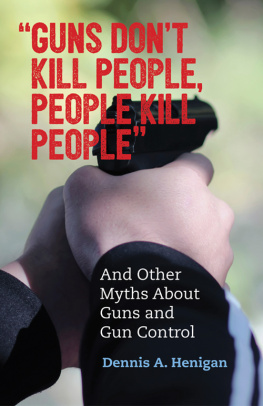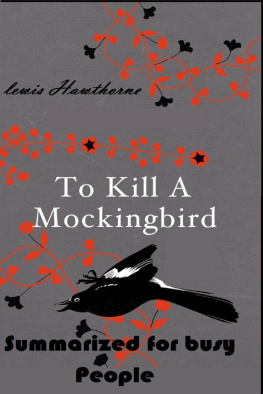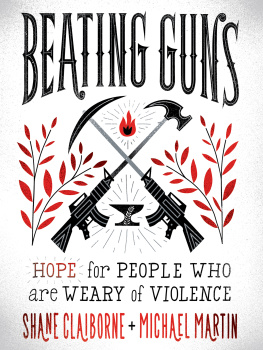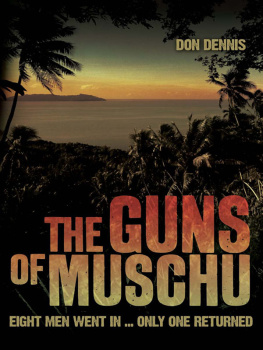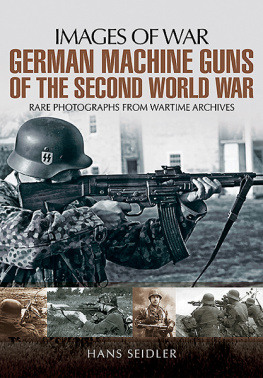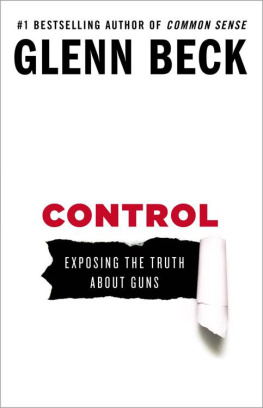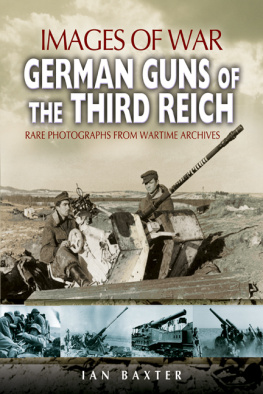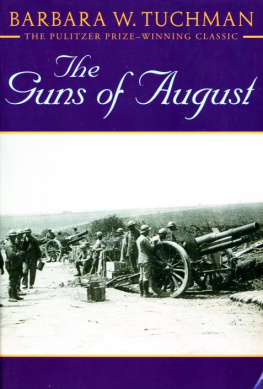To the memory of Jim and Sarah Brady
PROLOGUE
A T ORTURED M YTHOLOGY
The issue of guns in America causes people in other parts of the developed world to look at our country and shake their heads. They just dont get it. They dont understand why so many Americans have such passion for their guns. They dont understand why gun control is such a contentious issue. Most of all, they dont understand how America can tolerate its chronic carnage of deaths and injuries from gunfire, particularly among our children and particularly after the horror of the mass shooting at Sandy Hook Elementary School in Newtown, Connecticut, in December 2012 in which twenty first graders and six adults lost their lives. American children ages five to fourteen are eighteen times more likely to die of a gun homicide and eleven times more likely to die of a gun suicide than children in twenty-two other high-income countries. Particularly her children.
This uniquely American tragedy is often viewed from a political perspective. At every level of government, a powerful lobby, the National Rifle Association, disproportionately influences gun policy. The Washington Post has called the NRA arguably the most powerful lobbying organization in the nations capital and certainly one of the most feared.
What is truly astounding is that the NRA is able to block the enactment of legislation that is spectacularly popular with the American people. Reinstating the ten-year ban on AK-47s, UZIs, and other military-style assault weapons, enacted in 1994, enjoyed the support of 78 percent of the American people, with only 16 percent opposed, These are positions vehemently opposed by the NRAs leadership.
The NRAs power, of course, can be overcome. The Brady Bill was enacted into law in 1993 and is still stopping criminals from buying guns from gun dealers. Yet even the successful struggle to enact the Brady Bill can be seen as an illustration of the NRAs clout. Though the bill had public support consistently in the 8590 percent range, it took seven years to become law.
THE CURRENT STALEMATE
After the 2000 election, the NRA did a masterful job of deceiving the political punditry, and many in the Democratic Party, into believing that Al Gores support for gun control cost him the election. (The gun lobby successfully distracted commentators from the highly material fact that Gore won more popular votes than his NRA-supported opponent.) President Bill Clinton has asserted that the partys support for the Brady Bill and the assault weapons ban cost it a decisive number of congressional seats in the 1994 elections. The NRA could rightly claim to have made [Newt] Gingrich the House Speaker, the former president wrote in his autobiography.
The conventional wisdom formed around the idea that the gun issue is too politically risky for Democrats, particularly in swing rural and outer suburban areas. When in 2005 the party chose Howard Dean, who had received the NRAs support in Vermont, as chair of the Democratic National Committee, an insider Capitol Hill publication called it the last nail in gun control and a crippling blow to the gun-control movement.
The conventional wisdom did not account for President Clintons success in campaigning on the gun issue in 1996 (two years after the issue supposedly cost the Democrats control of the Congress) or for the stunning defeats of NRA-supported candidates in key 2000 Senate races (the names John Ashcroft of Missouri, Spencer Abraham of Michigan, Bill McCollum of Florida, and Slade Gorton of Washington State come to mind). Nor did the run from gun control Democrats explain why both John Kerry and George W. Bush endorsed renewal of the assault weapon ban during the 2004 presidential campaign. If gun control had become such political poison, how could this be?
The case of President Bush is particularly striking. When asked about the assault weapon ban in the third presidential debate, Bush not only endorsed its renewal; he went further to support closing the gun show loophole through requiring Brady Bill background checks for all gun-show sales, even though he was not even asked about gun shows. Karl Rove obviously thought there was a political price to be paid for Bush to be associated with the NRAs opposition to sensible gun laws.
Of course, President Bush wasnt sincere about his support for gun control. The NRA knew this and also knew that it would be politically damaging for Bush to publicly support the NRAs agenda. The gun lobby worked to elect a candidate who claimed to support two of the major priorities of the gun control movement, but who could nonetheless be counted on to do the NRAs bidding once elected. Their confidence was well placed, as President Bush later signed into law sweeping legal immunity for the gun industry.
The conventional wisdom would have an even more difficult time explaining the 2008 elections, particularly Barack Obamas decisive victory. After solidly pro-gun candidates like Fred Thompson, Mike Huckabee, Ron Paul, and Bill Richardson failed in the primaries, the NRA had little choice but to endorse a candidateJohn McCainwhom the gun lobby had long vilified for his support of legislation to mandate background checks at gun shows. In 2001, the NRA had called McCain one of the premier flag carriers for the enemies of the Second Amendment. To the gun lobby, however, he was by far a lesser evil than Barack Obama.
To put it mildly, the NRA went all in to defeat Obama. It said Obama and his vice presidential nominee, Joe Biden, constituted the most anti-gun ticket ever to run for the White House and a clear and present danger to Second Amendment rights. It launched a website, www.gunbanobama.com, dedicated solely to defeating Obama, and claimed to have spent at least $10 million on the presidential race (and millions more in the election generally). Top NRA officials personally campaigned for McCain in states including Pennsylvania, Colorado, Nevada, and Minnesotaall won by Obama. The group ran TV and radio ads against Obama in Colorado, New Mexico, Ohio, Virginia, Florida, Michigan, Minnesota, Wisconsin, North Carolina, and Pennsylvaniaall also won by Obama. It advertised nationally in USA Today.
Although the NRA consistently lied about Obamas gun control recordoutrageously accusing him of favoring a ban on the use of firearms for home self-defense, for exampleit is certainly true that no presidential ticket in history had a stronger record supporting gun control than Obama-Biden. Nor did candidate Obama run away from the gun issue during the campaign or retreat from any of the pro-control policy positions he had taken in the past. Indeed, in his convention acceptance speecharguably the single most important speech of his campaignObama directly addressed the issue with the words dont tell me we cant uphold the Second Amendment while keeping AK-47s out of the hands of criminals. The NRA did everything in its power to defeat Obama, yet he won a commanding victory.
In politics, however, perception is power. Despite the evidence that the NRAs capacity to affect elections is vastly overstated, during its first term, the Obama administration, as well as the Democratic leadership in Congress, governed according to the continuing perception that the Democratic Party still had everything to fear from the gun lobby. During his first year in office, Obama did nothing to stop amendments to credit-card reform legislation and transportation legislation (added by a Democratic Congress) that permitted loaded guns in national parks and unloaded guns in luggage areas on Amtrak trains, ultimately signing those bills without a word of protest about their gun provisions. In its report card, the Brady Campaign to Prevent Gun Violence gave the president straight Fs for his first-year gun control record.

